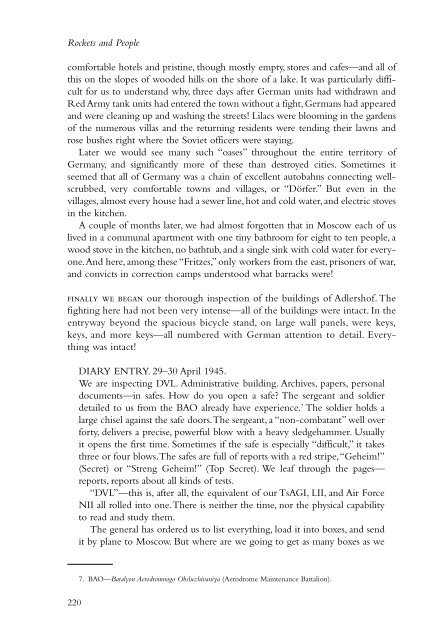to open next chapter. - NASA's History Office
to open next chapter. - NASA's History Office
to open next chapter. - NASA's History Office
Create successful ePaper yourself
Turn your PDF publications into a flip-book with our unique Google optimized e-Paper software.
Rockets and People<br />
comfortable hotels and pristine, though mostly empty, s<strong>to</strong>res and cafes—and all of<br />
this on the slopes of wooded hills on the shore of a lake. It was particularly difficult<br />
for us <strong>to</strong> understand why, three days after German units had withdrawn and<br />
Red Army tank units had entered the <strong>to</strong>wn without a fight, Germans had appeared<br />
and were cleaning up and washing the streets! Lilacs were blooming in the gardens<br />
of the numerous villas and the returning residents were tending their lawns and<br />
rose bushes right where the Soviet officers were staying.<br />
Later we would see many such “oases” throughout the entire terri<strong>to</strong>ry of<br />
Germany, and significantly more of these than destroyed cities. Sometimes it<br />
seemed that all of Germany was a chain of excellent au<strong>to</strong>bahns connecting wellscrubbed,<br />
very comfortable <strong>to</strong>wns and villages, or “Dörfer.” But even in the<br />
villages, almost every house had a sewer line, hot and cold water, and electric s<strong>to</strong>ves<br />
in the kitchen.<br />
A couple of months later, we had almost forgotten that in Moscow each of us<br />
lived in a communal apartment with one tiny bathroom for eight <strong>to</strong> ten people, a<br />
wood s<strong>to</strong>ve in the kitchen, no bathtub, and a single sink with cold water for everyone.And<br />
here, among these “Fritzes,” only workers from the east, prisoners of war,<br />
and convicts in correction camps unders<strong>to</strong>od what barracks were!<br />
finally we began our thorough inspection of the buildings of Adlershof. The<br />
fighting here had not been very intense—all of the buildings were intact. In the<br />
entryway beyond the spacious bicycle stand, on large wall panels, were keys,<br />
keys, and more keys—all numbered with German attention <strong>to</strong> detail. Everything<br />
was intact!<br />
220<br />
DIARY ENTRY. 29–30 April 1945.<br />
We are inspecting DVL. Administrative building. Archives, papers, personal<br />
documents—in safes. How do you <strong>open</strong> a safe? The sergeant and soldier<br />
detailed <strong>to</strong> us from the BAO already have experience. 7 The soldier holds a<br />
large chisel against the safe doors.The sergeant, a “non-combatant” well over<br />
forty, delivers a precise, powerful blow with a heavy sledgehammer. Usually<br />
it <strong>open</strong>s the first time. Sometimes if the safe is especially “difficult,” it takes<br />
three or four blows.The safes are full of reports with a red stripe,“Geheim!”<br />
(Secret) or “Streng Geheim!” (Top Secret). We leaf through the pages—<br />
reports, reports about all kinds of tests.<br />
“DVL”—this is, after all, the equivalent of our TsAGI, LII, and Air Force<br />
NII all rolled in<strong>to</strong> one.There is neither the time, nor the physical capability<br />
<strong>to</strong> read and study them.<br />
The general has ordered us <strong>to</strong> list everything, load it in<strong>to</strong> boxes, and send<br />
it by plane <strong>to</strong> Moscow. But where are we going <strong>to</strong> get as many boxes as we<br />
7. BAO—Batalyon Aerodromnogo Obsluzhivaniya (Aerodrome Maintenance Battalion).
















